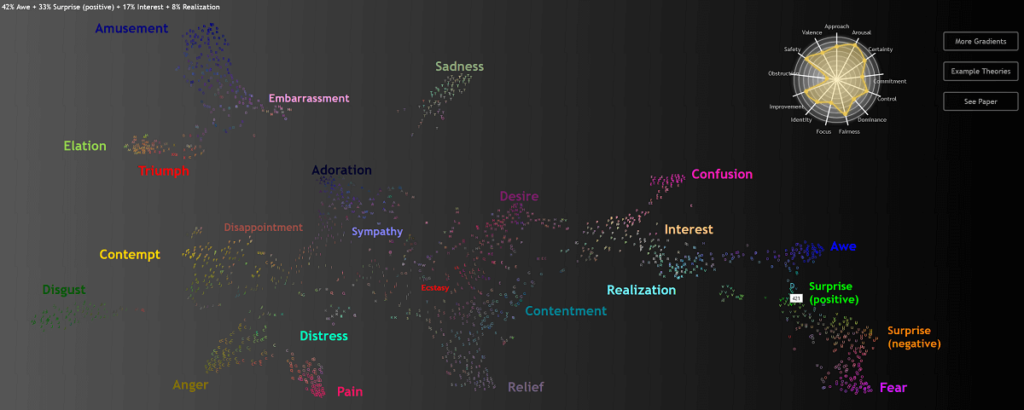This article explains empathy and describes why the voice is more important than facial expressions and gestures.

Photos (crops, from left to right) by Xavi Cabrera, Denis Tuksar, Luz Fuertes and Gage Walker from Unsplash.
Voice and mood belong together.
A person’s mood affects the way they speak and their voice. The feelings of the speaker change the melody, rhythm and timbre of the spoken language(prodosia). These changes are recognized and interpreted by others. They can tell whether a speaker is relaxed, nervous, happy or angry.
We develop the ability to recognize our mood from our voice in early childhood. Numerous scientific studies confirm that the human voice is an omnipresent medium for communicating emotions.
(Sources: Cordaro, Keltner, Tshering, Wangchuk, & Flynn, 2016; Kraus, 2017; Laukka et al, 2016; Vidrascu & Devillers, 2005)
Experiencing through the voice
Moods of the speakers are not only recognized, the mood of the speakers is also felt. The listener decodes the mood and experiences it a little for themselves.
When we listen to a person, we mentally imitate their way of speaking. If you speak soothingly, you soothe your audience. If you croak in a hoarse voice, you make them feel sorry for you.
www.zeit.de/zeit-wissen/
You can try this out for yourself to a certain extent:
The audible map of emotions
A team of researchers has created a map with 25 feelings. Feelings such as disgust, sympathy, interest, pain, surprise and amusement are depicted.

Call up the link and move the mouse over this map: you will hear spoken exclamations such as “Oh!”, “Ah!” or “Hey?!”, which are assigned to the feelings. Listen to the vocal expression of a region and you will become a little “infected”. This probably works particularly well with disgust or amusement. This “infection” is empathy.
Empathy in professional life
Empathy is the ability to recognize, understand and empathize with the feelings, emotions and thoughts of another person. This ability is particularly important in a professional context. Empathic managers motivate better and give more appropriate feedback. They resolve conflicts more quickly and ultimately make better decisions.
Emotions at virtual meetings
Since March 2020, a large proportion of business meetings have been held via telecommunications. A conference call or video conference is used for meetings with 3 or more people.
Are emotions better recognized in a video conference than in a telephone conference?
There is no evidence of this. Michael W Kraus has carried out experiments on this and the results are astonishing.
Emotions are even recognized more accurately with only spoken communication (voice only communication). If the participants can also see each other, the recognition of emotions deteriorates (voice and visual communication).
https://pubmed.ncbi.nlm.nih.gov/29016168/
Here it becomes clear that facial expressions and gestures are not as important for empathy as the sound of the voice: Videoconferencing is not superior to teleconferencing when it comes to recognizing the feelings of others.
Gestures and facial expressions are easier to control. The voice comes from within us and reveals something about our inner life.
The voice in meetings from the home office in times of Corona
Now that many meetings take place via telephone conference or video conference, the voice has a special role to play. It conveys human closeness. The voice replaces the handshake. The interpersonal contact established with the human voice is more intimate than the visual impression made by a webcam.
You should be aware of this before you go into a meeting in your home office.
Tips for a good voice in the conference call
- Warm up your voice a little. Humming is ideal for this. With a melody on your lips, your vocal chords will get going.
- Standing up makes for clear words. Whether you are sitting or standing, straighten up. Your stomach needs space.
- The throat also needs space for a good sound! If the situation allows, yawn heartily and repeatedly. This widens the throat and allows plenty of oxygen to reach the gray cells.
- Are you interested in the topic? Every conference call you take part in will have interesting content. Look forward to it. People will listen to you.
Sources: www.management-circle.de/ and www.zeit.de/zeit-wissen/
People who are interested in the importance of voice in a conference call are also reading:
More articles about our conference calls
- Activate detailed statistics – see unabridged phone numbers
- The web control of the conference call is personalized
- Dial, inside! Save dial-in number and room number.
- One click, full control! Without logging in to web control
- Inform successfully in conference calls!
4 minutes
